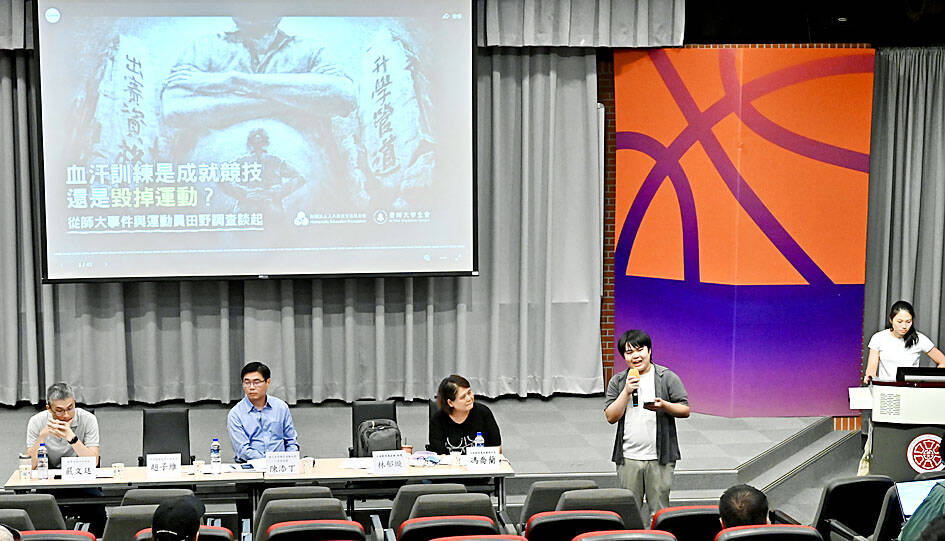Athlete training regimens should be improved to better protect athletes and uphold their rights, the Humanistic Education Foundation said yesterday.
With the ministry of sports to be inaugurated on Tuesday, minister-designate Lee Yang (李洋) should make sure training models are revamped to reduce the physical and mental trauma that athletes face, the group said at a seminar, citing interviews with athletes.
The verbal abuse and physical punishment that athletes face is beyond reason, and the conditions are not conducive to building a healthy competitive sports industry, it said.

Photo: George Tsorng, Taipei Times
The foundation played videos of interviews with 16 athletes aged 18 to 39, who said that in addition to trauma, verbal abuse and physcial punishments, they faced sexual harassment, while some coaches helped athletes cheat on their courses.
Most athletes have to endure abuse because coaches can decide whether they pass or fail required courses, the foundation said.
Student athletes are sequestered in a closed environment with almost every moment focused on their sport, so they are at a disadvantage when it comes to life planning or developing alternative interests, it said.
Foundation executive director Joanna Feng (馮喬蘭) urged the soon-to-be-established minsitry to implement transparent channels for complaints and oversight, improve moral education for coaches, make funding transparent, define “inappropriate charges” and set up fines to enforce laws against corporal punishment, bullying and sexual harassment.
Despite laws banning corporal punishment, 30 percent of education providers still use it, especially in athlete training programs, Feng said.
The ministry should compel sports education providers to make science-based training mandatory, including methods to prevent sports injuries, and to discontinue the practice of using athletes’ performances at competitive events to determine the effectiveness of training programs, the foundation said.
Moreover, the “antiquated system” in which senior students hold sway over other students should be eradicated, as it invites bullying, it said.
National Taiwan Normal University (NTNU) Student Association president Huang Liang-teng (黃莨騰) said that the NTNU women’s soccer scandal reflected how authority was abused in the sports sector.
Many coaches are unaware of how to establish benign interaction with their students, which causes pain for students, Huang said.
NTNU said that this semester it has launched four new measures to guarantee the rights of sports students and help them balance competitions with their studies.
It is also establishing a center for students’ physical and mental health, it said.
On July 20 the NTNU women’s soccer team issued a formal apology over a controversial research project that allegedly coerced students into having blood drawn.

Japanese footwear brand Onitsuka Tiger today issued a public apology and said it has suspended an employee amid allegations that the staff member discriminated against a Vietnamese customer at its Taipei 101 store. Posting on the social media platform Threads yesterday, a user said that an employee at the store said that “those shoes are very expensive” when her friend, who is a migrant worker from Vietnam, asked for assistance. The employee then ignored her until she asked again, to which she replied: "We don't have a size 37." The post had amassed nearly 26,000 likes and 916 comments as of this

US President Donald Trump said "it’s up to" Chinese President Xi Jinping (習近平) what China does on Taiwan, but that he would be "very unhappy" with a change in the "status quo," the New York Times said in an interview published yesterday. Xi "considers it to be a part of China, and that’s up to him what he’s going to be doing," Trump told the newspaper on Wednesday. "But I’ve expressed to him that I would be very unhappy if he did that, and I don’t think he’ll do that," he added. "I hope he doesn’t do that." Trump made the comments in

Tourism in Kenting fell to a historic low for the second consecutive year last year, impacting hotels and other local businesses that rely on a steady stream of domestic tourists, the latest data showed. A total of 2.139 million tourists visited Kenting last year, down slightly from 2.14 million in 2024, the data showed. The number of tourists who visited the national park on the Hengchun Peninsula peaked in 2015 at 8.37 million people. That number has been below 2.2 million for two years, although there was a spike in October last year due to multiple long weekends. The occupancy rate for hotels

A cold surge advisory was today issued for 18 cities and counties across Taiwan, with temperatures of below 10°C forecast during the day and into tonight, the Central Weather Administration (CWA) said. New Taipei City, Taipei, Taoyuan and Hsinchu, Miaoli and Yilan counties are expected to experience sustained temperatures of 10°C or lower, the CWA said. Temperatures are likely to temporarily drop below 10°C in most other areas, except Taitung, Pingtung, Penghu and Lienchiang (Matsu) counties, CWA data showed. The cold weather is being caused by a strong continental cold air mass, combined with radiative cooling, a process in which heat escapes from